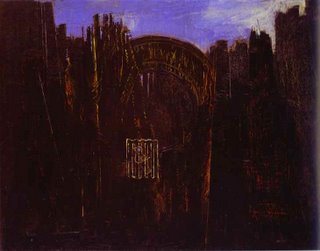In-human nature, or the un-naturalness of the human

It is perhaps a peculiar phenomenon to perceive the overwhelming violence of the Iraqi civil war, or whatever one can name the routine of massacres of
If capitalism is not a different formal representation of the law of nature, then nature would be totalitarian. When discipline becomes the ultimate sin, society collapses. The over- reproduction of humanity – what is often named civilization – is conditioned by an organizational element: the social pact. This pact can be named more accurately a synthetic form of organization (or government). A relation of domination and resistance that organizes the act of violence (or more accurately that determines what is an act of violence), by doing so, simultaneously becomes defiant to the law of nature. Humanity, by developing its own laws – laws that are aimed at legitimizing its reproduction beyond the limits of its surroundings, namely nature – gives a new definition to “fittest”. The fitness of the human unit becomes determined by the systems of knowledge that are defining the acknowledged reality at a certain time, in a certain place: A synthesized system of judgment which derives from a present balance of powers.
It is perhaps the initial absence of purpose that makes the eternal metamorphosis of these systems of knowledge possible. Laws always have an implied purpose, a higher good to which the regulation aims: normality, or ideality. When one compares humans to animals (while keeping in mind the relation between both), it is hard not to see the superiority of the later. The ultimate goal of human civilization is reproduction, or sustainability (the proper term would be over-reproduction). That of human thought is, however, truth, purpose, or better yet justification. It was Schopenhauer who saw the masochistic animal in the human subject. The only act of love, he asserted, was to reject the desire of reproduction.
It can be said that humanity’s goal was essentially the justification of its self-consciousness by achieving a conscious application of the laws of nature – or by finding “superior” ones in what it would call society. It is when God dies, that Pleasure – or Jouissance – takes its place. Pleasure is however itself similar to Law, regardless of all the contradictions that such a comparison would arouse, at least in its rejection of nature. It sets the limits of normality and eternally seeks an impossible object of pleasure: a new god. Yet, it is the persisting sense of emptiness that prevents the subject of ever becoming itself. The subject thus internalizes the illusions that he has made or others have (the wonders of communication) about life. The subject is lost in the abyss of auto-justification: he seeks a purpose for being; an impossible argument to reject nature. And what is to accept nature for a human but the unconceivable act of self-destruction?
When one looks at
Painting: Cage, forêt et soleil noir

0 Comments:
Enregistrer un commentaire
<< Home